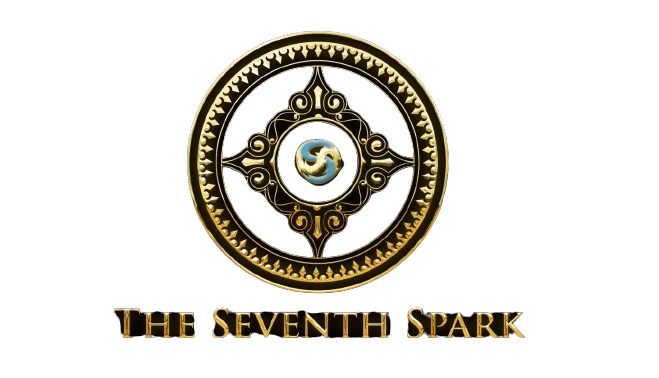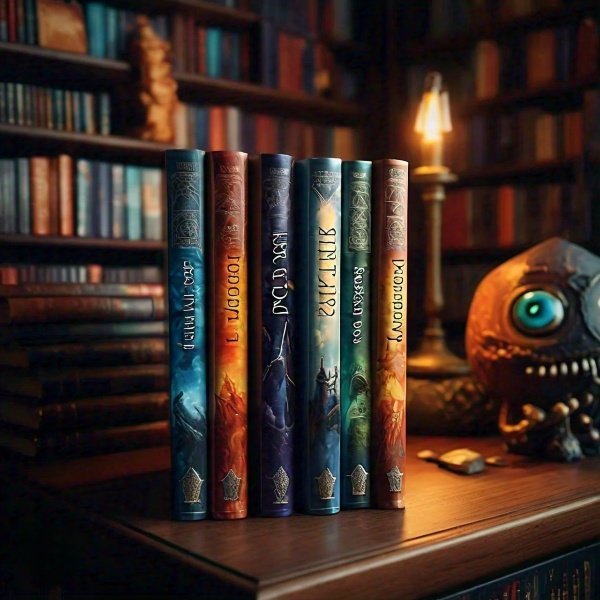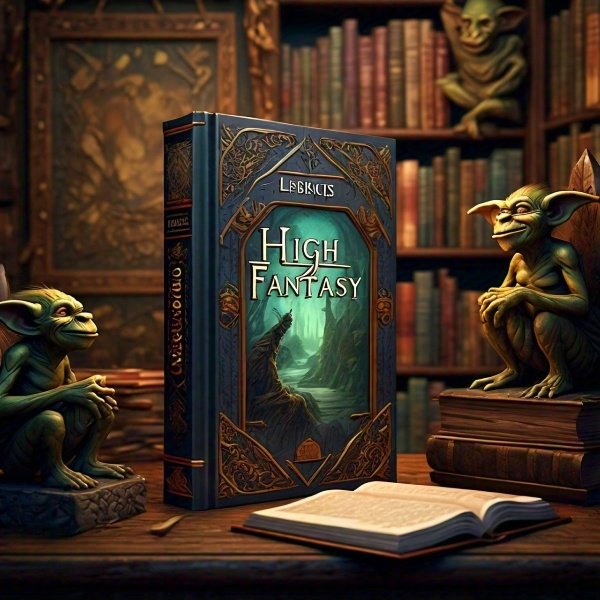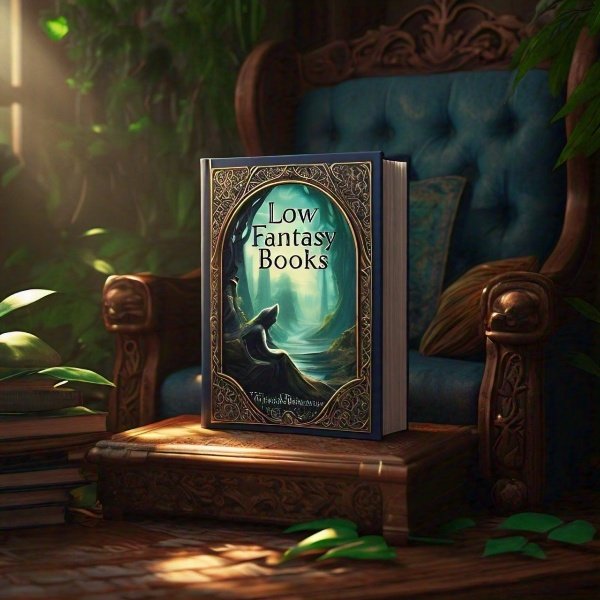High Fantasy Vs Low Fantasy: All You Need To Know
Fantasy encompasses a broad array of subgenres, ranging from urban fantasy and fantasy romance to paranormal elements and even elements of sci-fi.
As someone deeply passionate about crafting and exploring magical, monster-filled realms, I understand the challenge many authors face in navigating the diverse landscape of fantasy subgenres when embarking on their own literary projects.
A practical approach to distinguishing among these subgenres involves focusing on the setting of the narrative—deciding whether your story aligns more with high fantasy or low fantasy.
In this piece, we'll delve into the nuances of fantasy world-building and compare high fantasy with low fantasy. Additionally, I'll share a curated list of notable books and series from each category.
By the end of this guide, you'll be equipped with the insights needed to decide the perfect setting for your fantasy tale.
Exploring the Realms of Fantasy: High vs. Low
Fantasy literature transports us into realms of the extraordinary, featuring elements like magic and mythical creatures. But how do high and low fantasy differ?
High fantasy immerses readers in entirely fictitious worlds where the impossible becomes possible, from conversing with goblins and soaring through the skies, to battling dragons and casting spells.
Conversely, low fantasy sets its fantastical events within the familiar confines of our own world. Yet, this setting does not diminish the wonder and magic characteristic of the genre.
Let's dive deeper into the characteristics of high fantasy before exploring the unique allure of low fantasy.
High Fantasy: Dive Into a World of Imagination
Exploring the high fantasy genre can be an exhilarating experience for readers, though it presents a challenging endeavor for writers. This genre is characterized by its grand narratives set in an entirely fictional, alternative world, brimming with magical elements.
Central to high fantasy is its setting in a "secondary world," often underscored by epic tales reminiscent of ancient legends from Greek and Norse mythology. These stories weave intricate allegories of formidable creatures and heroic figures.
Many high fantasy novels draw parallels with the medieval era of our history—featuring horseback travel, battles with swords, and the hearty consumption of ale. However, don't feel confined by historical accuracy. High fantasy thrives on creativity, allowing authors the freedom to infuse modern elements into their fantastical worlds, making each tale uniquely captivating.
Exploring the Elements of High Fantasy
High fantasy novels transport readers into an entirely unique universe, distinctly separate from our own reality. Key features of high fantasy include:
An entirely fictional fantasy realm
Detailed maps that guide readers through the landscape
Lengthy narratives
Central quests or challenges
A diverse cast of characters with exotic names
Mythological beings, including various monsters and fantastical races
An abundant presence of magical elements
Thrilling sequences of battles and adventures
Intense conflicts, such as epic battles between good and evil, monstrous confrontations, or heroic triumphs
Compelling storylines enriched with numerous plot twists and intrigue
Explore These 10 Essential High Fantasy Reads
High fantasy transcends boundaries of age and gender, providing a rich landscape of modern tales that are as diverse as they are captivating.
Think beyond the classic realms of Tolkien, Greek myths, and age-old fairy tales. Today's high fantasy novels bring fresh perspectives that often surpass the tales of old in their vibrancy and relevance.
Predominantly ruling the Young Adult genre, high fantasy offers a fertile ground for exploring contemporary themes that resonate strongly with today's youth.
Dive into these ten unique high fantasy novels that promise enthralling adventures:
Strange the Dreamer by Laini Taylor
The Chronicles of Narnia by C.S. Lewis
The Name of the Wind by Patrick Rothfuss
The Discworld Series by Terry Pratchett
A Court of Thorns and Roses by Sarah J. Maas
Assassin’s Apprentice by Robin Hobb
Truthwitch by Susan Dennard
Children of Blood and Bone by Tomi Adeyemi
To Kill A Kingdom by Alexandra Christo
A Curse So Dark And Lonely by Brigid Kemmerer
These stories are not just books; they are gateways to worlds where the extraordinary becomes possible. Get ready to be transported!
5 Quintessential High Fantasy Screen Adaptations
Numerous high fantasy films and series, often derived from literary sources, transport audiences to realms distinctly different from our own. These narratives frequently blend elements of science fiction, exemplified by classics like Star Wars and Dune.
Here’s a selection of movies and TV shows that epitomize the grandeur and complex world-building characteristic of high fantasy, offering viewers a vivid portrayal of these extraordinary universes.
Lord of the Rings: J.R.R. Tolkien's Middle-earth stands as the quintessential high fantasy realm, replete with unique races, rich histories, and languages crafted solely for this universe. Peter Jackson's cinematic rendition of Tolkien’s world delivers these epic tales with breathtaking grandeur.
The Witcher: Originating from Andrzej Sapkowski’s novels and later evolving into a renowned video game, The Witcher has captivated audiences globally as a Netflix hit. In a medieval-esque realm teeming with humans, beasts, and sorcery, it tracks Geralt of Rivia, a genetically enhanced monster-hunter.
Shadow and Bone: Leigh Bardugo's Shadow and Bone trilogy, combined with her Six of Crows duology, has been transformed into a beloved Netflix fantasy saga. Set in a Russian-inspired universe, it features Grisha who wield various magical powers amid omnipresent dark forces.
Game of Thrones: George R. R. Martin's A Game of Thrones, the inaugural novel of his A Song of Ice and Fire series, set the foundation for HBO's massively successful TV adaptation. It presents a world reminiscent of medieval times but is enriched with dragons and mythical beings.
His Dark Materials: Philip Pullman’s trilogy, adapted into a TV series by BBC and HBO, explores the journey of two children across multiple parallel universes. His Dark Materials stands as a prime example of high fantasy aimed at younger audiences.
Having explored the realms of high fantasy, let's venture into another fantasy sub-genre—low fantasy fiction.
Low Fantasy Overview
Distinct from high fantasy, low fantasy grounds its narrative in the familiar realm of our real world. Often termed intrusion fantasy, this genre features magical and fantastical elements that seemingly 'intrude' into the everyday, merging the ordinary with the extraordinary.
Encompassing a broad spectrum, low fantasy includes genres like urban fantasy, historical fantasy, time slip, dark fantasy, superhero tales, contemporary fantasy, magical realism, and paranormal fantasy. These varied forms all share a common thread—they integrate creatures of myth and characters endowed with supernatural abilities into the world as we recognize it, whether set in the present or a historical context.
Embrace the thrilling blend of the mundane and the magical that low fantasy offers, where the extraordinary elements breathe life into the very world we inhabit.
10 Hallmarks of Low Fantasy
Writing low fantasy novels presents a unique opportunity to blend the magical with the mundane. In these tales, writers have the freedom to introduce elements of magic into our familiar world without needing to invent an entirely new universe.
There's no need to craft a wholly original fantasy realm since your story unfolds in our existing world, enriched with enchantments and supernatural happenings.
Key features of low fantasy include:
Everyday life infused with elements of fantasy
A concealed magic system intertwined with our known world
Characters endowed with supernatural traits navigating contemporary life
Ordinary humans who might be oblivious to the existence of magic and mystical creatures around them
Unlike its counterpart, high fantasy, low fantasy narratives do not rely on grand battles or monumental quests. The allure of 'magic hidden within our world' often captivates readers sufficiently on its own.
As an author in the realm of low fantasy, I find immense joy in weaving magical elements into the fabric of the real world. It’s particularly rewarding when readers express how these enchanting twists offer a fresh perspective on everyday realities, making the mundane appear magical.
Low fantasy literature often features an array of mythical beings like vampires, dragons, angels, and devils. It might also explore themes of time travel, superhuman heroes, or even alternate historical realities.
Here’s a curated list of ten diverse low fantasy books that are sure to captivate your imagination:
Good Omens by Terry Pratchett and Neil Gaiman
The Atlas Six by Olivia Blake
Vampires of Moscow by Caedis Knight
Ninth House by Leigh Bardugo
The Binding by Bridget Collins
The Path Keeper by N J Simmonds
No Gods, No Monsters by Cadwell Turnbull
The Time Traveler’s Wife by Audrey Niffenegger
Midnight Riot by Ben Aaronovitch
The Starless Sea by Erin Morgenstern
Explore these novels to discover how low fantasy can transform your view of our world!
Explore 5 Captivating Low Fantasy Series on Your Screen
Delve into the realm of low fantasy, where the extraordinary mingles with the ordinary, offering viewers a unique blend of reality and fantasy that captivates and astounds.
Noteworthy Low Fantasy Screen Gems Include:
True Blood: Dive into the sultry depths of the American South with True Blood, based on The Southern Vampire Mysteries by acclaimed author Charlaine Harris. The series chronicles the eerie yet thrilling exploits of Sookie Stackhouse, a telepathic waitress, in a society where vampires roam freely among humans.
The Boys: The Boys offers a gritty and satirical take on superheroes. Adapted from the graphic novel, this series explores the darker side of having superhumans in society and the disturbing ease with which their powers can be exploited and twisted.
Harry Potter: Join the magical journey of Harry Potter, a young wizard coming of age within the enchanted halls of Hogwarts School of Witchcraft and Wizardry. This beloved saga pits Harry and his friends against dark forces in a classic battle of good versus evil, peppered with mythical creatures and legendary adventures.
Outlander: Step back in time with Outlander, a sweeping romance that transcends time periods. Claire Beauchamp Randall, a nurse from the 1940s, finds herself transported to 18th century Scotland, where love and war collide as she meets Jamie Fraser, a charismatic Highland warrior.
Raising Dion: Raising Dion portrays the challenges of a widow struggling to protect her son, Dion, after discovering his supernatural abilities. This touching narrative explores themes of family and responsibility wrapped in the mysteries of Dion's emerging powers.
Embark on these extraordinary adventures where fantasy seamlessly integrates with the real world, offering a fresh perspective and thrilling experiences to viewers.
Frequently Asked Questions
What are the differences between High Fantasy and Low Fantasy?
High fantasy and low fantasy form the primary divisions within the fantasy genre. High fantasy, also known as epic fantasy, unfolds in an alternative universe filled with extensive magical elements, mythical creatures, and extraordinary technologies. In contrast, low fantasy brings elements of magic and mythical beings into the ordinary, everyday world.
What are the key elements found in Fantasy literature?
Key components of fantasy literature include intricate magical systems, expansive world-building, a dynamic ensemble of characters, a central quest, and the classic struggle between good and evil.
Conclusion
Crafting fantasy narratives demands immense creativity, dedication, and research. Whether you're constructing entirely new realms or integrating magical elements into our existing world, the process can deliver immense satisfaction to both the author and their audience.
I trust you've enjoyed exploring the realms of high fantasy versus low fantasy as much as I have enjoyed discussing them. Here's hoping this insight has sparked your imagination and guided your decisions for the setting of your next fantasy epic.
Best of luck, and enjoy the thrilling adventure of creating memorable and captivating worlds!




